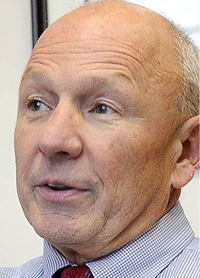Gov. Paul LePage’s proposal to change the way General Assistance money is distributed in Maine would shift costs to property taxpayers and increase homelessness, say officials in Portland and other cities.
The governor’s plan calls for the most far-reaching change to Maine’s General Assistance funding in 20 years, said Portland Mayor Michael Brennan.
“It will increase local property taxes and make hundreds of people homeless in Portland,” he said.
Portland is joining with nine other cities – Biddeford, Bangor, Lewiston, Auburn, Waterville, Augusta, Saco, Westbrook and South Portland – to pressure lawmakers to reject LePage’s proposal.
City managers and mayors from five of the cities met in Augusta on Thursday to discuss the issue.
Also on Thursday, the Maine Municipal Association’s policy committee voted to oppose the measure.
John Martins, spokesman for the Department of Health and Human Services, said LePage’s proposal is comprehensive and designed to limit the growth of the General Assistance program, which increased from $4.9 million in 2003 to $11.8 million in 2011.
He said the program, which is administered by cities and towns but funded mostly by the state, was intended to be the “last resort” for poor people in emergency situations.
He said 87 percent of the funding is now used to help people pay for housing, and that is not an appropriate use of the money.
“General Assistance is a program that needs returned to what it was intended to be for,” he said.
Martins said the current system encourages cities and towns to expand their programs so they can qualify for more state money.
LePage’s proposal would:
• Limit housing assistance to 90 days per calendar year, saving $3.3 million. That change would affect Portland, South Portland, Bangor, Lewiston and Waterville, according to the DHHS.
• Give all cities and towns a 50 percent reimbursement rate, saving $1.4 million. Bigger communities now can qualify for 90 percent reimbursement after they spend a set amount of money. The change would be expected to affect Portland, Bangor, Lewiston and Caribou.
• Eliminate General Assistance for anyone who receives federal Temporary Assistance to Needy Families funds, saving $978,666.
DHHS Commissioner Mary Mayhew told lawmakers Wednesday that her department is developing an alternative proposal.
Currently, cities and towns administer the program based on a standard formula of benefits and income criteria. Mayhew told lawmakers that the state could instead give communities fixed amounts of money, and the communities would have the flexibility to set their own criteria.
Lewiston City Manager Ed Barrett said he worries that some cities and towns could set criteria to limit the number of people who qualify, or limit their benefits. As a result, people would move to other communities, he said.
“Let’s say Bangor decides to be stingy, and Portland decides to be generous – and we know that people in Portland are generous – a lot of clients in Bangor will say, “Hey, let’s go to Portland.’”
Barrett said he’s particularly worried about the proposal to limit housing vouchers to 90 days. He said a landlord would balk at the idea of renting to someone whose housing voucher ends in three months. He said landlords wouldn’t want to risk ending up in a costly eviction proceeding.
As a result, there would be hundreds more homeless people in Lewiston, while the high vacancy rate in downtown apartments would get even higher, he said.
In Portland, the General Assistance budget for fiscal year 2012-13 is $7.9 million, of which city taxpayers pay about $1.8 million and the state pays about $6.2 million.
LePage’s proposal would reduce the state’s payments to $3.95 million. Portland officials would then have to decide whether to increase property taxes to make up the difference, said Doug Gardner, director of Portland’s Health and Human Services Department.
“Everything being equal, this is a significant cost shift to the local property taxpayer in Portland and across the state.”
Biddeford Mayor Alan Casavant, who also serves as a Democratic state representative, said he also worries that LePage’s proposal would increase property taxes.
He said, “What we are trying to do is make the state aware that municipalities can’t become victims by shifting costs.”
Staff Writer Tom Bell can be contacted at 791-6369 or at:
tbell@pressherald.com
Twitter: TomBellPortland
Send questions/comments to the editors.



Success. Please wait for the page to reload. If the page does not reload within 5 seconds, please refresh the page.
Enter your email and password to access comments.
Hi, to comment on stories you must . This profile is in addition to your subscription and website login.
Already have a commenting profile? .
Invalid username/password.
Please check your email to confirm and complete your registration.
Only subscribers are eligible to post comments. Please subscribe or login first for digital access. Here’s why.
Use the form below to reset your password. When you've submitted your account email, we will send an email with a reset code.